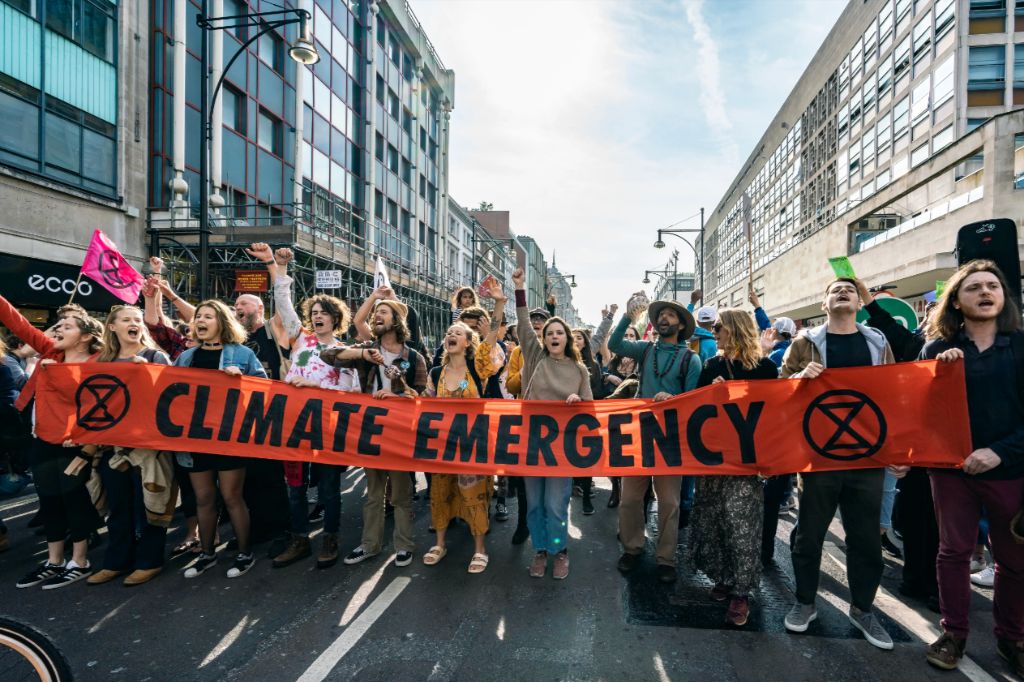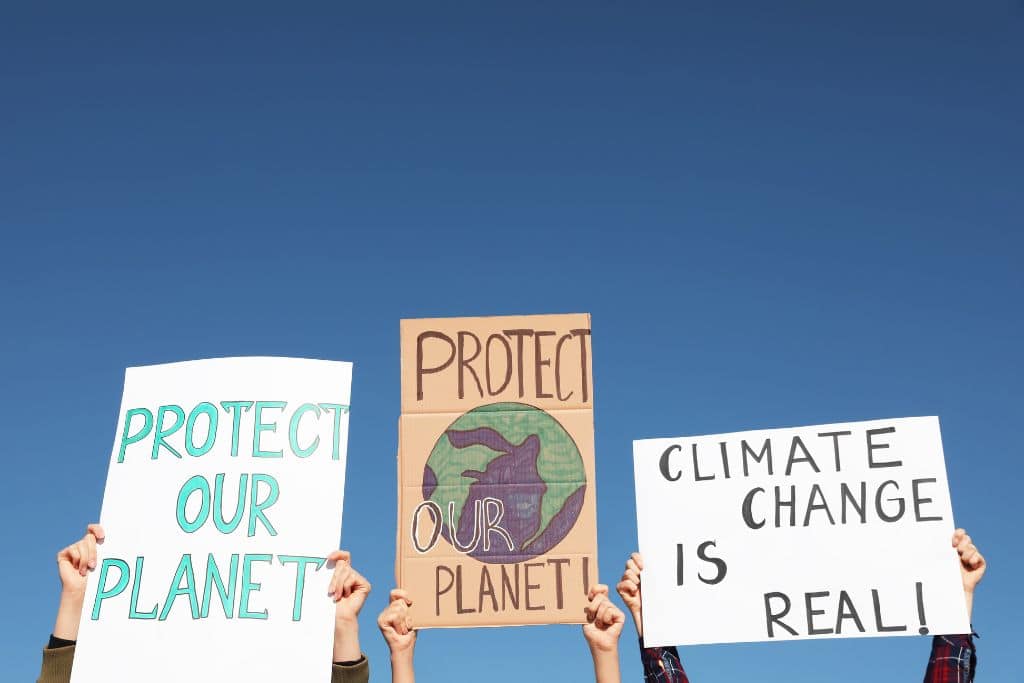Our mental health and well-being have been negatively impacted by news and direct experiences around climate change and pressing environmental issues that are affecting our planet. In a rapidly changing world, we must learn how to prioritize self-care and coping mechanisms to continue making positive changes for a better tomorrow without sacrificing our mental health.
—
Pollution, natural disasters, and other environmental hazards are causing many people to experience increasing feelings of anxiety over the future of our planet. In 2022, the National Institute for Health Care Management (NICHM) released an infographic revealing that 61% of the world population felt anxious about climate change, and 67% reported feeling afraid.
Many of us experience feelings of anxiety and a sense of helplessness when we come across news stories and headlines about natural disasters and the impacts of climate change. Experiencing environmental crises first-hand also negatively impacts our mental health. Natural disasters and extreme weather patterns are often traumatic and are life-altering for entire communities. There is no question that exposure to environmental crises through news sources and lived experience takes a toll on our mental health. But it is exactly for this reason that we must begin prioritizing self-care and learning effective coping strategies to continue making positive changes toward a hopeful tomorrow.
You might also like: What Is Climate Anxiety?
Bad News
In order to understand how exposure to environmental issues through the news can lead to negative emotions and mental health outcomes, it is important to understand how we consume information and how this impacts our brains.
First of all, we tend to pay more attention to negative news and overlook the positive. This is not a bad thing in itself; this tendency helped keep our ancestors safe and prevented them from being eaten by predators like saber-toothed tigers. While it might sound counter-intuitive, being in a state of fight or flight triggers the release of a neurotransmitter, dopamine, which plays a crucial role in our brain’s reward center. Being chased by a dangerous predator might not seem like a rewarding experience but to our ancestors, the safety of escape would have been akin to winning the lottery. The release of dopamine reinforces the motivation to fight or flee our way to safety.
Instead of running from wild animals to avoid getting eaten, we now have to contend with broader existential threats. Most of us scroll through various feeds on different social media apps and consume information curated to our unique, individual interests. Just like our ancestors, we too pay attention to things that we perceive as potential threats to our survival. Because of our natural propensity toward noticing threats to our safety, most people will agree that their social media feeds are riddled with negative headlines. This is because algorithms are built to display content that generates the most engagement. The headlines that get the most clicks are usually ones that align with our inclination toward identifying perceived threats. Because climate change and other environmental crises pose a threat to our safety and well-being, it is no surprise that we are surrounded by headlines that revolve around the existential threats of rising temperatures.
More on the topic: 4 Ways Social Media Can Further Climate Research
Our salience of danger has served us well, ensuring our survival for thousands of years. However, in today’s world, it does more harm than good to our mental health. Our perception is influenced by the information we consume. When mostly negative pieces of information constantly surround us, whether we are conscious of it or not, our mood is negatively impacted. Some of us might become desensitized and apathetic to events that would otherwise elicit an emotional response. Others experience the opposite, leading to hypervigilance and increased fear while going about day-to-day life. Both of these outcomes are often seen in individuals who have experienced traumatic events. This is because, even though we might not experience a tragedy firsthand, it is still distressing when we hear about it.
The Aftermath We Cannot See
While it is unlikely that watching the news will give you post-traumatic stress disorder (PTSD), living through a natural disaster very well might. According to the US Department of Veterans Affairs’ National Center for PTSD, approximately 30% to 40% of people who have been directly affected by a natural disaster will develop PTSD. A 2023 review exploring intervention and treatment options for survivors of natural disasters revealed that within the first two years following natural disasters, 5% to 60% of those affected will experience PTSD-related symptoms.
One of the biggest risk factors for developing PTSD is a lack of social support and low social cohesion among communities. Natural disasters can destroy the livelihoods of many people in a short amount of time, leading to home loss, job loss, and even the loss of loved ones and pets. For those with already little social support, these losses can be that much more devastating.
Rising temperatures and extreme heat also have a negative impact on our mental health. People with certain pre-existing mental health conditions have been estimated to have a 5% increase in mortality for every increase of 1C (1.8F).
Most people can relate to feeling irritated or cranky during the hottest days of the year. Extreme temperatures negatively affect our overall mental health in multiple ways. For one thing, higher temperatures result in poor quality of sleep. Just as light influences our sleep-wake cycles, temperature also plays a role in regulating our circadian rhythms. Poor sleep quality has a negative impact on mood and exacerbates mental health conditions such as depression and anxiety.

Taking Care of Ourselves Is Taking Care of the Planet
Experiencing feelings of distress when encountering information about the state of the environment and climate change is not an unreasonable reaction. If we did not care, we would not worry. For many of us, these feelings serve as a powerful motivator to take the necessary steps to make changes in our personal lives and our communities. As we know, these feelings can also lead to poor mental health and wellness. It is difficult to feel motivated when we get to the point of losing hope, which is why self-care and coping strategies are important measures we must take in order to continue making positive impacts for the future of our planet.
If you are experiencing anxiety over climate change or environmental destruction, you may find it challenging to find a means of self-care that comes without guilt. Many people, when thinking of self-care, imagine getting a manicure, spending a day at the spa, eating comfort foods, or shopping sprees. Some of these activities can be harmful to the environment and may create more negative feelings for those who are already feeling down in the dumps about the state of the environment. Firstly, it is not self-care if it creates more negative feelings than there were before. Secondly, self-care is not one-size-fits-all.
Here are some self-care and coping strategies you can try the next time you notice environmental issues affecting your mental health and well-being:
1. Unplug or unfollow
As mentioned, we are constantly bombarded with information through sources like the news or social media. The unfortunate reality is that much of this information is negative, no matter the topic. Set a time limit for how long you scroll through your phone each day or temporarily step away from social media. If temporarily deleting your social media apps or setting a time limit seems like too much, unfollowing pages that spike your anxiety is also an option. Remember, you can always follow any pages you unfollow later on.
2. Shift the focus to what is within your control
We are not going to save the world overnight. One person cannot repair the damage that has been done alone. It is important to remember that a lot of issues related to the environment are systemic. While this is frustrating, and often makes us feel powerless, there are still many things that we can do that are within our control. Sometimes, we need to step away from those larger problems that are beyond our reach and take inventory of what changes or impacts we can make in our personal lives and within our communities. Remember, even the smallest things make a huge impact.
3. Be in touch with nature
We spend so much time on our phones worrying about the environment instead of spending time with it, that it is easy to forget that our Earth is still very much alive and beautiful. You do not have to be in the middle of the wilderness to appreciate nature. Go for a walk to your local park, or just simply around the block. Research has shown that spending 120 minutes outdoors each week, just 17 minutes a day, is linked to positive mental health and wellness outcomes. If you are not sure how to spend that time outside, you might consider sipping your morning coffee on your patio, planting a small herb garden, or simply meditating are great ways to get started. If you do not live near any green spaces, bring the green inside your home with some easy maintenance houseplants.
4. Remember to take care of your physical health and safety
Sometimes, the weather might not permit us to go outside and be in touch with nature. Whether the reason is severe weather or extreme heat, it is important to make sure you take care of your physical health and safety. Keep your cool during heatwaves by drinking plenty of water, and avoid going outside during the hottest hours of the day. If your air conditioner is not working or keeping your home cool enough, try heading to a public space that has air like your local library or grocery store to wait out the heat. During severe storms, stay in doors and away from windows. Have a battery powered radio on hand in case you lose power, and be aware of hazards such as broken power lines after the storm has passed. Making sure you are prepared and know what to do when the weather is not great can help prevent illness and injury, and give you some peace of mind even in difficult situations.
Final Thoughts
Environmental crises and climate change are distressing issues that can have a profound impact on our mental wellness. Whether bad news about natural disasters is bringing the mood down, or you are recovering from the aftermath of a severe storm, it is important to address the impact of environmental issues on our mental health. Taking a break from the news, celebrating the positive impacts we make (no matter how big or small), spending time outdoors are all simple things we all do to take care of ourselves. Taking care of our mental health also means taking care of our physical health and safety during extreme weather events. When we are our best selves, the motivation to make positive changes comes easier than when we feel hopeless. Remember that there is always a rainbow at the end of each storm.
This story is funded by readers like you
Our non-profit newsroom provides climate coverage free of charge and advertising. Your one-off or monthly donations play a crucial role in supporting our operations, expanding our reach, and maintaining our editorial independence.
About EO | Mission Statement | Impact & Reach | Write for us


















